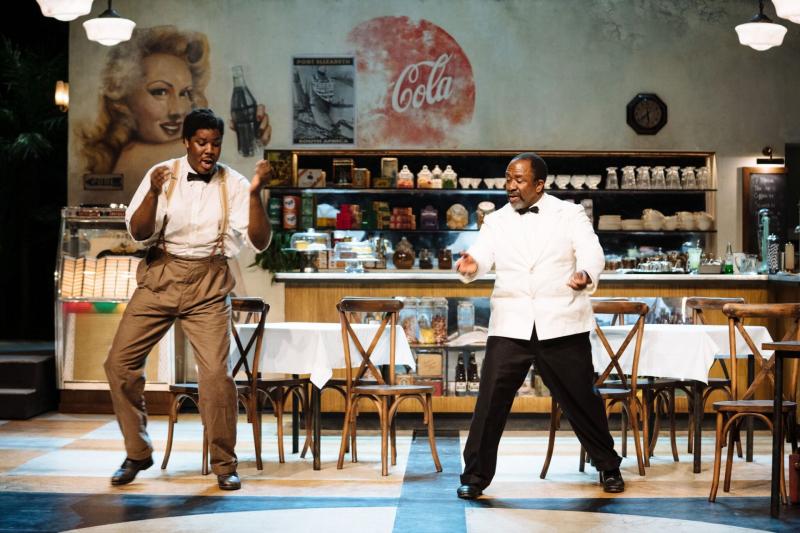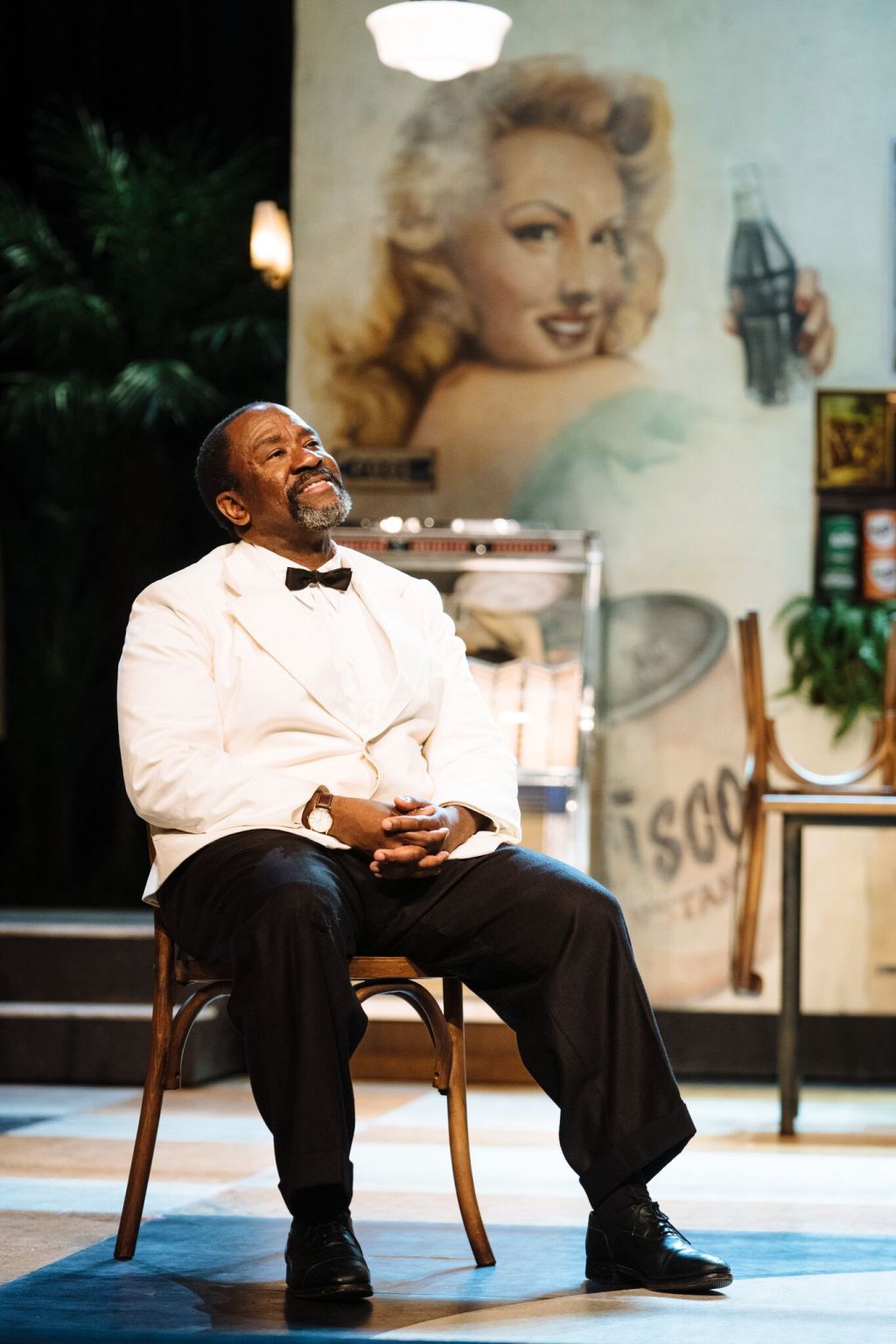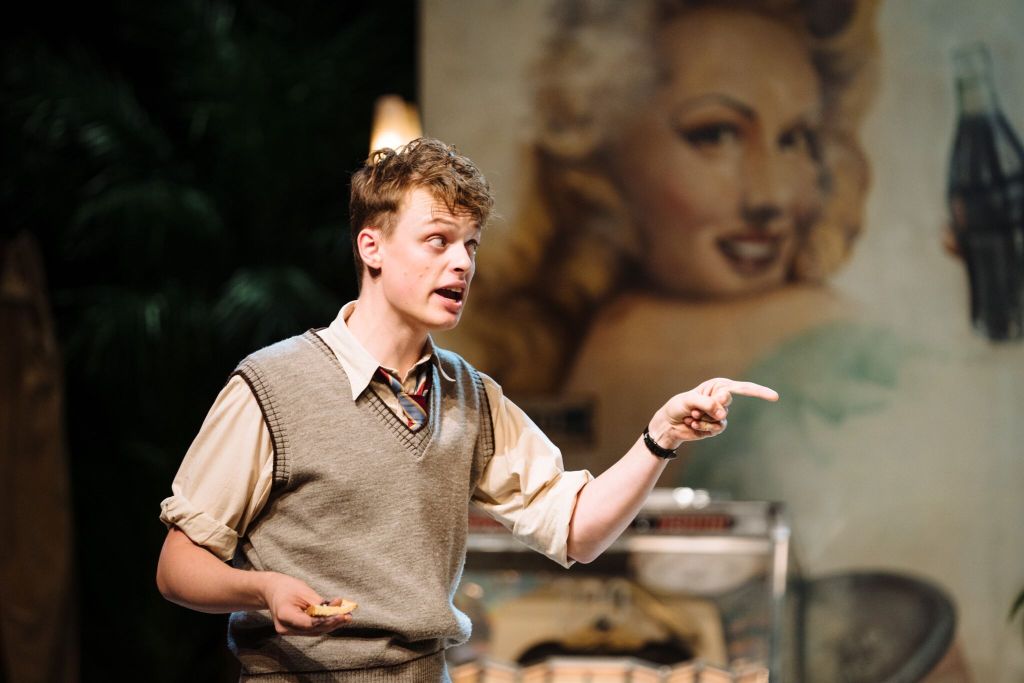'Master Harold' and the Boys, National Theatre review - timelessly moving | reviews, news & interviews
'Master Harold' ... and the Boys, National Theatre review - timelessly moving
'Master Harold' ... and the Boys, National Theatre review - timelessly moving
Athol Fugard's 1982 self-exorcism is searingly revived

Time has been kind to Athol Fugard's "Master Harold"...and the Boys. It's a stealth bomb of a play that I saw in its world premiere production in New Haven, Connecticut, in 1982 and that has been a regular part of my playgoing life ever since.
The recent star of the National's brilliantly reconceived Amadeus, Msamati (pictured below) here inherits Zakes Mokae's Tony-winning role of Sam, one of two black waiters at a deserted Port Elizabeth tearoom run by the (unseen) mother of the teenage Hally (19-year-old newcomer Anson Boon), the white "Master Harold" of the title. It's 1950 South Africa, and Hally thinks nothing of using the language of slavery and "primitives" to address two family employees, Sam and the younger Willie (Hammed Animashaun). Both men, it soon becomes clear, have been far more loving and paternal to this adolescent misfit than either of his own parents, whom we gain an acute sense of via a series of gatheringly anxious phone calls.
 It was Sam who constructed the makeshift kite that sent the young Hally's spirits soaring. In his company Hally would seek refuge from the ministrations of a demanding mother at the continual beck and call of a drunken cripple of a father: a shaming presence whom Hally calls "chum" even when the boy wishes he could be anywhere else. Across 100 uninterrupted minutes on a rainsoaked afternoon during which he seeks refuge in the two waiters' company, Hally renews the time-honoured bonds which a single action late in the play will upend, perhaps forever. The wounding results leave the Sarah Vaughan song "Little Man" to linger pregnantly in the air as the lights fade.
It was Sam who constructed the makeshift kite that sent the young Hally's spirits soaring. In his company Hally would seek refuge from the ministrations of a demanding mother at the continual beck and call of a drunken cripple of a father: a shaming presence whom Hally calls "chum" even when the boy wishes he could be anywhere else. Across 100 uninterrupted minutes on a rainsoaked afternoon during which he seeks refuge in the two waiters' company, Hally renews the time-honoured bonds which a single action late in the play will upend, perhaps forever. The wounding results leave the Sarah Vaughan song "Little Man" to linger pregnantly in the air as the lights fade.
Weise, director of last season's much-lauded Nine Night, starts this production with a Vaughan song, "Tenderly", that sets a mood that is sometimes ironic, sometimes not. There's certainly nothing tender in Hally's dysfunctional family, nor in Willie's abuse of the partner with whom he hopes to win the local ballroom dance championship - he's learning the steps from the more seasoned Sam. The dance-off is arguably more resonant now than at the time of the play's premiere, when such competitions weren't the rage they have become. The image of a world "without collisions" informs a metaphor-heavy script that Weise navigates with supreme grace. This production is far lighter on its feet than some I have seen.
Msamati ranks among the best Sams in my experience: he adroitly sidesteps the temptation with this part to play the saint when it's clear throughout that Sam is a fallible individual who risks falling into the sandpit of ugliness that Hally opens up before him. Smaller of stature than many a Sam, Msamati communicates a preternatural grace that has its own rending effect on a landscape where bonhomie can turn on a dime. He's wittily matched, too, with the more physically imposing Animashaun, whose Willie is a manchild at odds with his own combative impulses.  Hally is the hardest role of the three, as authorial surrogates tend to be. A portrait of the playwright as a damaged and damaging young man, Hally can't contain the impulse to displace his anger towards his parents in the direction of the two men he truly loves. One has to admire Anson Boon (pictured above), an English TV and film actor making his professional theatre debut, for jumping in the deep end - his performance will surely benefit from less signalling as the run continues.
Hally is the hardest role of the three, as authorial surrogates tend to be. A portrait of the playwright as a damaged and damaging young man, Hally can't contain the impulse to displace his anger towards his parents in the direction of the two men he truly loves. One has to admire Anson Boon (pictured above), an English TV and film actor making his professional theatre debut, for jumping in the deep end - his performance will surely benefit from less signalling as the run continues.
Weise keeps the play moving across the wide expanse of Rajha Shakiry's hugely evocative set, and it helps, of course, that movement comes embedded in the text itself. And he's wrought an intriguing change to the very end by prolonging the jukebox music so as to move beyond despair to a place called hope. And why not? Isn't that where most of us wish we could live?
- Master Harold" ... and the Boys at the National Theatre until 17 December
- Read more theatre reviews on theartsdesk
rating
Share this article
The future of Arts Journalism
You can stop theartsdesk.com closing!
We urgently need financing to survive. Our fundraising drive has thus far raised £49,000 but we need to reach £100,000 or we will be forced to close. Please contribute here: https://gofund.me/c3f6033d
And if you can forward this information to anyone who might assist, we’d be grateful.

Subscribe to theartsdesk.com
Thank you for continuing to read our work on theartsdesk.com. For unlimited access to every article in its entirety, including our archive of more than 15,000 pieces, we're asking for £5 per month or £40 per year. We feel it's a very good deal, and hope you do too.
To take a subscription now simply click here.
And if you're looking for that extra gift for a friend or family member, why not treat them to a theartsdesk.com gift subscription?
more Theatre
 Troilus and Cressida, Globe Theatre review - a 'problem play' with added problems
Raucous and carnivalesque, but also ugly and incomprehensible
Troilus and Cressida, Globe Theatre review - a 'problem play' with added problems
Raucous and carnivalesque, but also ugly and incomprehensible
 Clarkston, Trafalgar Theatre review - two lads on a road to nowhere
Netflix star, Joe Locke, is the selling point of a production that needs one
Clarkston, Trafalgar Theatre review - two lads on a road to nowhere
Netflix star, Joe Locke, is the selling point of a production that needs one
 Ghost Stories, Peacock Theatre review - spirited staging but short on scares
Impressive spectacle saves an ageing show in an unsuitable venue
Ghost Stories, Peacock Theatre review - spirited staging but short on scares
Impressive spectacle saves an ageing show in an unsuitable venue
 Hamlet, National Theatre review - turning tragedy to comedy is no joke
Hiran Abeyeskera’s childlike prince falls flat in a mixed production
Hamlet, National Theatre review - turning tragedy to comedy is no joke
Hiran Abeyeskera’s childlike prince falls flat in a mixed production
 Rohtko, Barbican review - postmodern meditation on fake and authentic art is less than the sum of its parts
Łukasz Twarkowski's production dazzles without illuminating
Rohtko, Barbican review - postmodern meditation on fake and authentic art is less than the sum of its parts
Łukasz Twarkowski's production dazzles without illuminating
 Lee, Park Theatre review - Lee Krasner looks back on her life as an artist
Informative and interesting, the play's format limits its potential
Lee, Park Theatre review - Lee Krasner looks back on her life as an artist
Informative and interesting, the play's format limits its potential
 Measure for Measure, RSC, Stratford review - 'problem play' has no problem with relevance
Shakespeare, in this adaptation, is at his most perceptive
Measure for Measure, RSC, Stratford review - 'problem play' has no problem with relevance
Shakespeare, in this adaptation, is at his most perceptive
 The Importance of Being Earnest, Noël Coward Theatre review - dazzling and delightful queer fest
West End transfer of National Theatre hit stars Stephen Fry and Olly Alexander
The Importance of Being Earnest, Noël Coward Theatre review - dazzling and delightful queer fest
West End transfer of National Theatre hit stars Stephen Fry and Olly Alexander
 Get Down Tonight, Charing Cross Theatre review - glitz and hits from the 70s
If you love the songs of KC and the Sunshine Band, Please Do Go!
Get Down Tonight, Charing Cross Theatre review - glitz and hits from the 70s
If you love the songs of KC and the Sunshine Band, Please Do Go!
 Punch, Apollo Theatre review - powerful play about the strength of redemption
James Graham's play transfixes the audience at every stage
Punch, Apollo Theatre review - powerful play about the strength of redemption
James Graham's play transfixes the audience at every stage
 The Billionaire Inside Your Head, Hampstead Theatre review - a map of a man with OCD
Will Lord's promising debut burdens a fine cast with too much dialogue
The Billionaire Inside Your Head, Hampstead Theatre review - a map of a man with OCD
Will Lord's promising debut burdens a fine cast with too much dialogue

Add comment